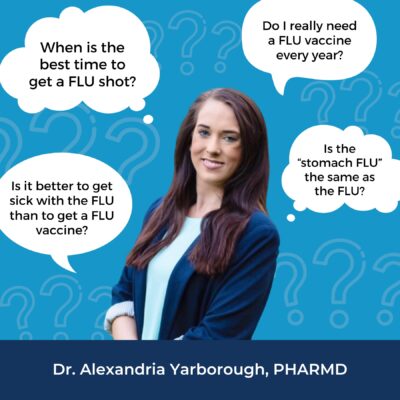- Flu Facts
- Flu Vaccine Information
A Community Pharmacist Answers Your Questions About the Flu: Part 1

According to the CDC, increased influenza activity has been reported in most of the US. Annual flu vaccination is the most important step to prevent getting and spreading the flu.
As a community pharmacist, I get a lot of questions about the flu.
When is the best time to get a flu shot?
Right now! The CDC recommends mid-late October before Halloween but anytime before the end of the year (December 31) is key. It takes two weeks for antibodies to develop in the body and provide protection against the flu That’s why it’s best to get vaccinated before it starts to spread in your community.
I get the vaccine on the same day each year; is that okay?
That’s a great reminder but definitely not required since the flu shot provides immunity for the season, not a calendar year. The flu season is considered Fall/Winter with peaks in December/January but activity is sometimes seen as late as May. This flu season, you will get the 2022-2023 seasonal vaccine.
How late is too late? Is it too late to get vaccinated after Thanksgiving (or the end of November)?
No, that’s not too late! Vaccination can still be beneficial as long as flu viruses are circulating. If you have not been vaccinated by Thanksgiving, it can still be protective to get vaccinated in December or even later. Flu is unpredictable and seasons can vary. Seasonal flu disease usually peaks between December and March most years, but the disease can occur as late as May.
Is the “stomach flu” the same as the flu?
It is not. You may have heard the term ‘stomach flu’ describing illnesses associated with nausea, vomiting, or diarrhea. These symptoms can be caused by many different viruses, bacteria, or even parasites. While they can sometimes be related to the flu, these symptoms are rarely the main symptoms of influenza. The flu is a respiratory disease and not a stomach or intestinal disease. The most common flu symptoms are fever, headache, fatigue, body aches, dry cough, sore throat, and runny or stuffy nose.
Are any of the available flu vaccines recommended over the others?
Yes, for some people. For this flu season (2022-2023), there are 3 flu vaccines that are preferentially recommended for people 65 years and older. These include;
The Fluzone High-Dose Quadrivalent vaccine
Flublok Quadrivalent recombinant flu vaccine
Fluad Quadrivalent adjuvanted flu vaccine
This recommendation was based on a review of available studies which suggests that, in this age group, these vaccines are potentially more effective than standard dose flu vaccines. There is no preferential recommendation for people younger than 65 years.
Is it better to get sick with the flu than to get a flu vaccine?
No. Flu can be a serious disease, particularly among young children, older adults, and people with certain chronic health conditions. Any flu infection can lead to serious complications, hospitalization, or even death, even among otherwise healthy children and adults. Vaccines go through years of research and clinical trials before they are made available to the general public. That said, getting vaccinated is the safer choice.
Do I really need a flu vaccine every year?
Absolutely! The CDC recommends a yearly flu vaccine for everyone six months and older with rare exceptions. Immune protection from certain vaccines declines over time, so annual vaccination is needed to get the best protection against the flu. Additionally, flu viruses are constantly changing, so the vaccine composition is reviewed and updated each year.
The information above is summarized and adapted from CDC guidelines. Visit cdc.gov for more information.

